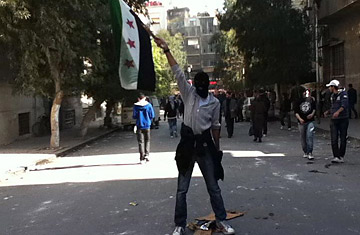
A Syrian protests against the country's President Bashar Assad in Damascus on Dec. 19, 2011
(2 of 2)
Most, says Yazbek, arrive knowing that they will be welcomed by a government that supports them and wants Assad out. Last month French officials said they would beef up security for Syrian refugees, fearing that regime supporters could target them in Paris. One possible target is Burhan Ghalioun, a professor at the Sorbonne University in Paris, who is chairman of the Syrian National Council, one of three opposition groups. "The biggest ones supporting the revolution are the French," Yazbek says, adding that many opposition figures like Ghalioun now live in France.
Yet despite that support, Yazbek says she, like most Syrian refugees, does not believe she will be able to return home soon. Indeed, she met TIME for lunch after her daily French lessons, which she says are essential because she expects to have to live in France for some time. "I have zero hope that Assad will leave," she says. "The situation in Syria is hopeless."
Among the biggest hurdles the revolution faces are the divisions within opposition groups, and lack of a strong Arab supporter for its cause — in contrast to Qatar's key backing for Libya's rebels. The Arab League observer mission to Syria during the past week has been "even worse for the revolution," she says. "It is pure theater, and a charade, just to create a kind of good political image."
The sense that the opposition faces big obstacles ahead — despite a growing global outcry about the shooting of demonstrators — is shared by Syrian analysts. On Monday, the Eurasia Group's Middle East analyst in Washington, Ayham Kamel, wrote that the Syrian army would ditch its support for Assad "only when a credible alternative leadership emerges," and predicted that Assad would endure comfortably in power through most of 2012, although could well be forced out late this year — most likely when opposition groups secure sufficient weapons to fight the regime. "Militarization of the opposition will become a more dominant feature in the conflict," Kamel wrote to Eurasia's clients, "further increasing the risks of civil conflict becoming a broad civil war."
Yazbek says she dreads the prospect of civil war. She declines to talk about the extended family she has left behind in Syria, saying only that since she is an Alawite — the minority clan that has held a tight grip on power in Syria for decades — she has distanced herself from her relatives. That break could become permanent if the country descends further into war.
Yazbek says she and many others who've fled to France have grown to accept that they are in a vastly different position from the Libyans whose revolt against Muammar Gaddafi exploded 11 months ago, a month before Syrians took to the streets — though like their Libyan counterpart, the Syrian opposition faced tear gas and gunfire from security forces.
In the Libyan revolution, however, French President Nicolas Sarkozy backed the rebels, persuading his E.U. colleagues, and then the U.N. and NATO, to launch a military campaign to force Gaddafi out, the only such intervention of the Arab Spring. This time around, too, Sarkozy has again taken the lead in Europe, helping to usher in stiffer E.U. sanctions against Syria and pushing for a broader U.N. embargo.
But in stark contrast to Libya, no international military intervention has come — and, says Yazbek, the Syrian exiles have given up hoping for one. "We think NATO does not want to intervene because we have no oil, and it would never recoup the money that it would cost to intervene," says Yazbek. With no foreign fighter jets to bomb Assad's forces, she says, "The solution in Syria is not clear."
